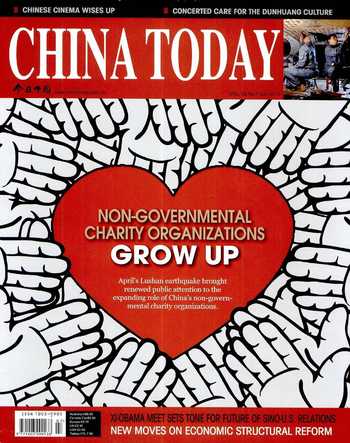Xi-Obama Meet Sets Tone for Future of Sino-U.S. Relations
By WANG SHAOZHE & LIAO QIN
THE talks between Chinese President Xi Jinping and his American counterpart Barack Obama on June 7 and 8 at Sunnylands in Rancho Mirage, California, marked the first face-to-face meeting between the leaders since Xi assumed office and Obama won his second term. China and the U.S. share the worlds most important bilateral relationship; whether the talks would yield productive results or be mired in disagreement on key issues was the subject of much media speculation.
Happily, theres good news to report. Both sides agreed to build a new type of relations between major countries based on mutual respect and mutual benefits with win-win results, and laid out a comprehensive blueprint for the future development of bilateral ties.
Mutual Trust
Xi said at the news conference after the talks that he had told President Obama China was committed to the path of peaceful development. As economic globalization continues at a rapid pace – and as all countries need to “sail in the same boat when faced with rough seas” – China and the United States should find a new type of relationship befitting their status as the worlds two largest economic entities. A break from past “major power” relationships, which featured confrontation and conflict, was needed. Xi stressed that a cooperative relationship between China and the U.S. could help reduce conflict worldwide and promote stability.
President Obama emphasized to Xi his belief that it is in the interests of the United States for Chinas rise to stay on a peaceful path. He acknowledged that the two countries are more likely to realize their respective security and development goals through cooperation rather than confrontation.
According to Wu Xinbo, chief of the Center for American Studies of Fudan University, in order to dispel unease in some sectors of American society about Chinas newfound clout, China reiterated in the talks its position on peaceful development. The U.S. made clear, Wu said, that it welcomes this peaceful rise, and that it would not try to “contain”Chinas growth, thereby assuaging worries in Beijing.
President Obama said that both Xi and himself recognized this unique chance to take the U.S.-China relationship to a new level, and emphasized his determination to grasp the opportunity.
The content of discussions between the Chinese and American leadership remain confidential, but all signs point to a frank, in-depth exchange of opinions between the two sides, and consensus on a number of key issues.
One potential stumbling block in the relationship is that of miscomprehending one anothers strategic goals. Talks such as those at Sunnylands go a long way towards enhancing mutual trust in strategic affairs. That Xi and Obama have established an obvious personal rapport also strengthens trust between the leaderships of the worlds largest developed country and largest developing country.
Jin Canrong, vice-president of the School of International Studies of Renmin University, said that the meeting achieved its anticipated results and set the tone for Sino-U.S. ties in the coming years. The hallmarks of this relationship will be staving off conflicts, stepping up exchanges and conducting closer cooperation. “This is a meeting of historic and strategic significance,” Jin said.
The Sino-U.S. relationship has decisive influence on the international relations arena in the 21st century. The leaders of the two countries have now pledged to build a new type of relationship built on “no conflict and no confrontation”, “mutual respect”, and “cooperation toward win-win results.” This is of global relevance. The consensus reached by the two presidents also highlights the growing irrelevance of “China Threat” theory advocates, and has profound significance in the Asia-Pacific region and the world over.
In the near future, China and the U.S. should grow even closer and find more common ground when dealing with sensitive issues. This will be of benefit both to the two countries and the entire world.
New Starting Point
The two presidents laid out details of the bilateral ties they envisioned in the coming years. Xi elaborated at the press conference after the talks on the five reasons why he had confidence in the future of Sino-U.S. “major country” ties. “China and the United States need to deepen mutual understanding, strengthen mutual trust, further develop cooperation and manage our differences so as to avoid the conventional route of confrontation between major countries, and truly embark on a new path,” Xi said.
Xis ideas form the principle tenets of this new type of relationship. The grand blueprint they outline will be fleshed out through more dialogue mechanisms at various levels of government, and through extensive economic and people-to-people cooperation
The two presidents reached agreement on several key issues, including building a new model for their military-to-military relationship. Dialogue between armed forces is key to amicable relations between the two major countries. Xi and Obama also agreed to cooperate on the issue of cyber security. A work team will be established to handle the policing of cyber crime, thus converting a potential source of conflict into an opportunity for collaboration.
Many high-profile exchanges are scheduled for the months following the Xi-Obama summit. Among them are a new round of strategic and economic dialogues, a high-level consultation on people-to-people exchanges, and visits to the U.S. by Chinese Minister of Foreign Affairs and Minister of National Defense. These occasions will gradually shape the new course of Sino-U.S. relations as agreed upon at Sunnylands.
Zhou Shijian, senior research fellow with the Center for U.S.-China Relations, Tsinghua University, said that the Xi-Obama summit marks a new starting point for bilateral ties.
As Jin Canrong sees it, the two leaders talks were never expected to come up with solutions to specific issues. Rather, their purpose was to send a message that cross-Pacific ties have never been better. By that measure, Sunnylands was surely a great success.

